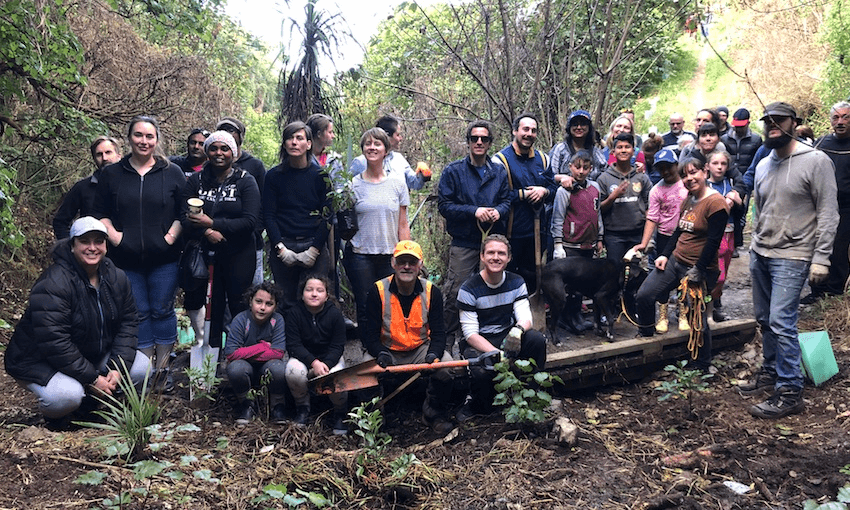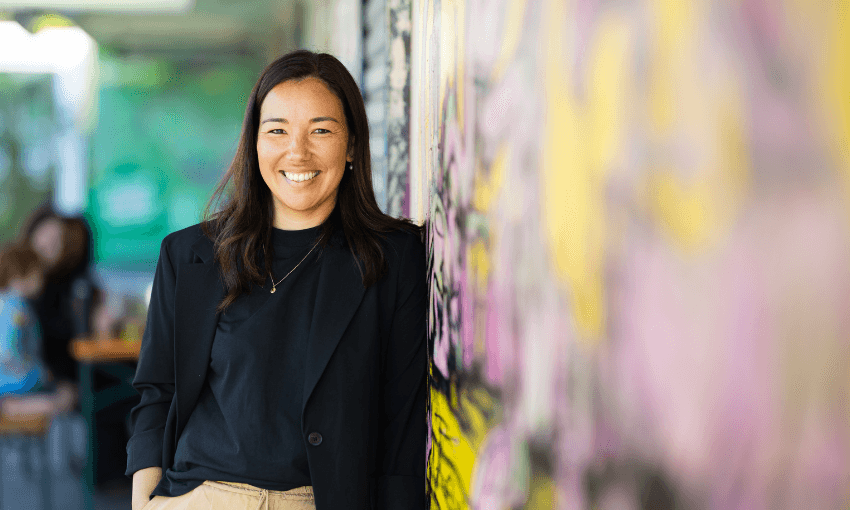When 60 CEOs signed up to the Climate Leaders Coalition in July 2018, much was made of the presence of the big players like Air New Zealand, Spark, Fonterra and Vector. The Spinoff caught up with the nimble smaller companies leading from the back.
Since the launch of the Climate Leaders Coalition last year, 82 CEOs have signed the joint statement committing their organisations to take voluntary action on climate change. Since then much focus has been on the big players, and just how committed they are to a carbon zero future that demands difficult questions of their status quo.
But also within the coalition are smaller companies with ambitions of being better than ‘neutral’ and making a positive contribution to climatic change. These are startups who began as they meant to go on – with the natural environment at the heart of their strategic decision-making. These are dynamic and versatile smaller companies that are providing leadership and practical solutions to combating climate change.
Product stewardship company 3R Group, payroll tech company Thankyou Payroll and electricity retailer Flick operate in different industries and at different scales, but they share a commitment to sustainability and a zero carbon future that has been part of their operations from the start. They also share a commitment to using ‘tech for good’ – bringing the best of software and engineering innovation to solving problems. They’re part of a new generation of businesses who are trying to live up to the demand for radical transparency and meaningful contribution to the wider community beyond strict economic measures.
The Spinoff spoke to these businesses about their commitment to the Climate Change Coalition, why it is important, and how far we all have to go to ensure the world as we know it doesn’t disappear.
Thankyou Payroll
Thankyou Payroll CEO Christina Bellis has been in the job for three years, and in that time has seen her company grow from five employees to 21. It’s a payroll company operating under the ‘social enterprise’ umbrella, helping employers pay their employees while giving back to charities and environmental issues with any extra profit.
HR is an industry that has operated in the same way for years. But Thankyou was founded on a commitment to creating a new model with a triple-bottom-line approach: social, environmental and financial.
In 2006 the IRD introduced a subsidy of up to $10 per pay run to encourage small businesses to use payroll professionals to handle their PAYE obligations. It was enough for Thankyou Payroll’s founder to realise she could provide a service to employers for free, then donate 25c to charity from each $10 subsidy.
“We started with the environmental and social consciousness at our core and built the business from that. Any of our decisions are still built into our mission or our values,” says Bellis.
Thankyou Payroll now services over 7000 businesses, and while they did end up having to introduce a fee for their service, they remain free to use for registered charities. They are still a small but growing business, but this has never discouraged Bellis from building the brand as a leader of sustainability in New Zealand. She says it was an easy but important decision to sign onto the Climate Leaders Coalition.
“I think leadership is really important, people taking a stand and joining together. There is power in numbers. It’s really important to be supporting [climate change action] because we’re all going to have to deal with it together.
“I know that there are some massive organisations that have signed up and collectively we are about 50% of all of Aotearoa’s emissions. Thankyou Payroll is probably around a 0.01% of that and there are much bigger players, but every single one of us plays a role in moving towards a more sustainable environment and better climate solutions for the next generation,” she says.
The company is already certified as carbon neutral, something Bellis is immensely proud of, and she wants it to be carbon negative by 2021. The Thankyou Payroll model is proof that traditional sectors don’t have to follow traditional business models to do exceptional things, she says.
“Business as usual should not exist. We can recreate business and make ‘business as usual’ a social enterprise model where we’re taking care of more than just our shareholders. We can demonstrate that the model works.”
3R Group
The current state of our economy and consumer culture is linear by nature. We use products till they are of no use anymore, then we get rid of them – to recycling plants, compost heaps, or most popularly and problematically, landfills.
While people are rapidly catching on to the idea of reducing, reusing and recycling, 3R is taking the next step, helping companies to breathe new life into the things other people would consider trash. Their aim is to educate people and businesses by thinking up strategies to make the ‘three R’s’ easier to implement.
CEO Adele Rose says the idea behind the business came from the two founders who, while working in the waste sector, noticed the excessive amounts of plastic being sent to landfill.
“Our beginning point was to reduce hazardous plastic packaging from the waste stream and then to apply a hierarchy of use to that packaging so that it was nil to landfill and it created additional value for the recycled plastic.”
One of the cycles 3R has helped to create is with paint shops like Resene and Dulux, whose plastic paint pots were being sent to landfill because of the toxicity of the paint. Customers now pay a levy when they purchase paint, allowing them to take the packaging and any unused paint back to the Resene store.
“If there’s more than a third of usable paint in there then they set that aside for community work, a lot of it goes to murals and schools. If it’s less than a third or is looking a bit grotty or if it’s an empty pail, then it goes into a bin for one of our nationwide collections,” says Rose.
“We take that packaging and extract any of the residual paint, the pails are then shredded and go back into a process where they’re remanufactured back into pails, and the leftover paint has a further process applied to it and is mixed to be used for graffiti abatement, or it can go into making a mixture for concrete.”
Rose says the Climate Leaders Coalition comes with a high degree of responsibility for the company that prides itself on following through on words with action. Even as a small member in terms of turnover, 3R believes it has a significant role to play, especially as it can help other businesses create change.
“We’re talking to local people about being a business owner around the age of 50, whose children and grandchildren are going to be experiencing the effects of climate change. We sit in that age group where we have to make a change because what we are leaving for our children and children’s children is currently a massive job,” says Rose.
With just 30 employees, 3R never felt too small to lead change, says Rose. She sees small business as a cornerstone of New Zealand culture (they represent over 80% of New Zealand businesses), and therefore have the opportunity to direct the conversation around sustainability.
“Small businesses can make the biggest impact. They are inherently led by the owner or the major shareholder, they have really close connections with their community and with their staff, and they live on the reliability of their suppliers. They’re highly networked, closely connected, and the opportunity for them to be influencers is massive.”
Flick Electric
In 2014 Wellington power company Flick Electric flipped the script on the electricity market. From its beginning, Flick prided itself on core values of fairness, honesty and transparency. Over the last five years, the company has not only provided an alternative to power pricing, but also clear accountability for the decisions they make as a company.
In 2016, Flick Electric was CarboNZero accredited. The company’s emissions are offset at the Hinewai Native Forest on the Banks Peninsula and internally its waste management systems are assisting in cutting down its emissions. Flick’s head of communications and external relations, Victoria Crockford, says she wants the company’s internal work to help facilitate larger conversations across the business landscape.
“With the values of sustainability and transparency at our core, we’re really excited about contributing to a wider conversation and wider action, and more importantly joining some of these more visible businesses to say ‘actually some of these smaller businesses have got this stuff as part of their foundation.”
That’s why the Climate Leaders Coalition was an important move for the company – alongside some of New Zealand’s biggest businesses “showing that they were transparently committed to science-based targets,” Crockford says.
Flick Electric is small, especially in the huge world of power companies, but Crockford says she sees this as an advantage for the company’s commitment to climate change. There’s no downside to reducing your footprint, and small businesses have a unique opportunity to lead the charge and show others it is possible, she says.
“The bigger ships are harder to turn around so smaller companies can provide leadership because we can make changes more quickly. We’re a digital-first company so we can be in the business of building consumer tools as part of our business.
“As a newer company, our foundations are in the current climate change situation, as our profound reality. It’s not something that our systems and our culture have to transition to or change in order to react; we’ve been founded as a part of that world.”
Reducing emissions is the first step to take for any business or individual, says Crockford, but since some emissions are simply unavoidable, the offsetting programmes that are available in New Zealand are a great solution.
“We are necessarily going to emit carbon in the current business operations climate. Recognising that as the reality, what is the best step to mitigate that impact? We believe it’s investing in those local projects [which don’t only have] carbon offset potential, but also have biodiversity and restoration potential. The flip side of that is that we’re always committed to reducing our carbon so the necessity of offsetting becomes less and less.”
The company is eager to widen the dialogue about what power use means and empower customers to make informed decisions about the power they use. Its app CHOICE allows consumers to see information on where electricity on the grid is being sourced, giving them the ability to use more power when it’s coming from renewable sources, and cut power use when there’s a lot of carbon on the grid.
“Everything comes at an environmental cost and so empowering people to make easy choices to lower their environmental cost was really important to us,” says Crockford.
The app is all part of Flick’s drive to encourage conversations about what we as individuals – and as a society – can do to address climate change. Crockford believes New Zealand businesses have a huge role in leading that conversation – but they must be willing to be scrutinised.
“I’m really proud that New Zealand businesses are willing to have these quite hard dialogues. People ask critical questions which are really important. Exposing yourself to those questions and being willing to have that glare of transparency is really something worth celebrating.”
This content was created in paid partnership with Flick. Learn more about our partnerships here.





